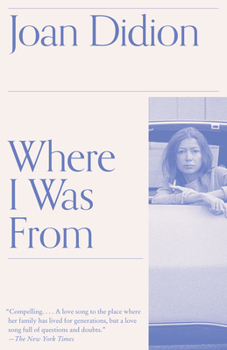Where I Was from: A Memoir
Select Format
Select Condition 
Book Overview
From the bestselling, award-winning author of The Year of Magical Thinking In this arresting amalgam of memoir and historical timeline" (The Baltimore Sun), Didion--a native Californian--reassesses parts of her life, her work, her history, and ours. Didion applies her scalpel-like intelligence to California's ethic of ruthless self-sufficiency in order to examine that ethic's often tenuous relationship to reality. Combining...
Format:Paperback
Language:English
ISBN:0679752862
ISBN13:9780679752868
Release Date:September 2004
Publisher:Vintage
Length:240 Pages
Weight:1.15 lbs.
Dimensions:0.7" x 5.1" x 7.9"
Customer Reviews
5 ratings
Some dreamers of the golden dream
Published by Thriftbooks.com User , 17 years ago
"A good deal about California does not, on its own preferred terms, add up." This sentence, which opens Didion's third chapter in Where I Was From, is characteristic of the sort of pummeling understatement and reserve that characterizes all of Didion's work - humble, free of ostentation, profound in implication. No, the California Didion presents does not add up - a place defined by a jettisoning pioneer spirit "destroyed" by its own sense of development, a place defined equally by class as it is by people who say sentences like "we don't discuss class here," a place , Didion's Sacramento specifically, both defined by and existing in spite of its geography. Her contradictions of place and identity take Didion from one heavily scrutinized example to another - the Spur Posse, Boeing, Douglas, pioneers on the Sierra Nevadas, prisons, insane asylums - and if Didion's argument of conflicted identity doesn't always connect in thinking later about her specifics, the reading is as fluid, as full-bodied in argument and fact, as merciless an investigation as anything she's ever written. Didion has long been defined by her identity to California, something that comes up in all of her writings, whether in New York or El Salvador, so to see her tackle it so specifically - at one point even deconstructing (with fascinating effect) her own first novel, Run River - is a thrill. What will be of most fascination, undoubtedly, will be the 4th section of the book, the short, devastating section detailing the death of Didion's mother, yet what makes this piece so compelling is the grand scale of Didion's research and work - her California becomes a grand exercise in characterization. Her description in this section is some of the most agonizingly evoked, rich, and understated work of her career, and if the sections preceding it - highly descriptive, full of research often much fuller and drier than expected - can seem aimless when thinking about them, the finest compliment I can give Where I Was From is that, in the effortless and moving reading of the book, it evokes exactly what Didion wants of California, of her, and of her mother, and no more.
Where we came from
Published by Thriftbooks.com User , 18 years ago
WHERE I WAS FROM is Joan Didion's meditation on her native state of California. Though much of the huge population of the state was not born there, Didion, like this reviewer, is the descendant of 19th century pioneers who established ranches that are long gone. Didion went looking for what makes California itself, what it imparts to its natives. Her findings, rendered in that elegant stingray voice like ice water splashed on the face on a scorching day in the Central Valley, may surprise a lot of readers. No one could possibly achieve a personal portrait of California and include every iconic landmark or quirk. The film industry does not figure into this, LA's waterworks is not here. This is not Steinbeck's California, or Kerouac's or Dashiell Hammett's. It is, however, the landscape of Frank Norris's THE OCTOPUS, Jack London's VALLEY OF THE MOON, Faulkner's short story, "Golden Land," and Henry George's prescient essay, "What the Railroad Will Bring Us," to which Didion brings a close reading. The settling of California was made possible by the government and the sense of entitlement still resounds, as does the seemingly contradictory rugged pioneer individualism that claims the right to do as one pleases without strings attached. There is a pioneer code, "kill the rattlesnake," meaning to act in the interest of the greater good so others are not hurt, but there is also the overwhelming theme of development, the meaning of which Didion finds in the act of selling the family cemetery, along with the ranch. The lesson about development is also played out through the history of the Lakewood community tangent to LA, one that did not exist until the 1950s when it was created on former ranch land and became a whole town with a resident employer, the defense contractor McDonell Douglas, with whose fortunes, given and taken away by the federal government, it rose and emptied, spewing forth a notoriously violent, purposeless youth culture. This book resonates deeply with me--as a child, I watched my animal-loving mother weep as she killed the rattlesnake, and the ranch and the winery were gone by the time I was born--but I have to think that this beautifully crafted book should be of value to all Americans because, as John Donne said, none of us is an island and what happens to one part can bear significance for the rest.
Making peace with California
Published by Thriftbooks.com User , 19 years ago
I was disappointed by California the first time I visited and that disappointment deepened into dislike when I happened to live there for a year. And yet I always felt ambivalent about this dislike, because when I went out into the small towns of California, away from the glamor spots and the sprawl, I liked the place and its people ... well enough. Californians felt unknowable to me. They were often so friendly initially, but I never got the feeling that I would ever get to know them any better, no matter how much effort I put into it. Where I Was From circumvents this dilemma. A native California has decided to tell us some of the secrets of the place: how it has shaped its people and how they in turn have shaped it. One of Didion's revelations is that California has enormous amounts of agricultural land and yet very few Californians call themselves "farmers". Golden State land owners treat their land purely as a commodity and do not have the visceral attachment to the land itself that is found in farmers in the rest of the country. You see how a lot of other things could cascade from this basic difference between Californians and everyone else. Didion's long discourse on the Spur Posse of Lakewood at first seemed like a digression. But it soon became clear that she sees the nature of the Lakewood community to be a logical latter-day expression of the California socio-historical phenomenon. Lakewood was built only to provide a place for aerospace workers to live. It is housing, not a real community. It is planned rootlessness. And this has consequences. By relating some of her own family history, Didion reminds us that all Californians are from somewhere else and so must have been more like the rest of us at some point. She suggests that it was the isolation of being on the far side of the Sierras in a land of enormous natural wealth that unmoored and, to some extent, unhinged Californians and their culture. I believe her.
Amazing California
Published by Thriftbooks.com User , 20 years ago
I grew up in the mountains south of Yosemite in the 1950's and 60's and have lived here ever since. I've worked as a logger, carpenter, and building designer and now spend much of my time hiking the trails in the High Sierra (not in that Arizona nursing home yet). Anyway, I've had a lifetime spent drinking in the reality that is California. Reading Joan Didion's book has furthered and edified my knowledge, thoughts, and intuitions of this region. Reviewers who think she is upset or complaining are missing the point. Didion delves deep and helps people like me fill in some blanks to this fascinating human comedy.
America's greatest writer pops out her best book yet
Published by Thriftbooks.com User , 20 years ago
This is possibly as close as the famously oblique Joan Didion will ever come to writing a memoir. It takes a master stylist to weave together such disparate threads as one family's heritage, manifest destiny, Didion's eighth-grade commencement speech, her first novel (an atavistically brave move), the works of other writers (Jack London, Victor Davis Hansen), notes on pop painter Thomas Kinkade and Lakewood's infamous "Spur Posse," and more.I can't think of any writer could do a better job than Didion at examining the weird admixture of passion and ambivalence that a native Californian may have for her state. I share it, and I admire this book especially because I know the terrain she dissects and lays bare. Her spare prose is a joy to read.
Where I Was From Mentions in Our Blog

Happy 20th Anniversary to Us!
Published by Ashly Moore Sheldon • June 20, 2023
Thriftbooks is ringing in a milestone anniversary this year—twenty! In celebration, here are twenty terrific books, spanning a variety of genres, that came out the year we were born.





